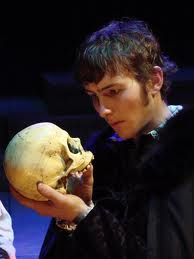
Publisher:
Bonnie King
CONTACT:
Newsroom@Salem-news.com
Advertising:
Adsales@Salem-news.com

~Truth~
~Justice~
~Peace~
TJP
Dec-26-2012 23:49

 TweetFollow @OregonNews
TweetFollow @OregonNews
On being dead, Pt. 1
by Daniel Johnson, Deputy Executive Editor"Existence, the preposterous miracle of existence, still remains the mystery of all mysteries."
(Physicist, John Archibald Wheeler)
 Alas, poor Yorick, I knew him well. |
(CALGARY, Alberta) - Two men are walking along. Says one: “Do you believe in life after death?”
“Yes,” says the other man.
The first man asks: “Then how do you know you’re not dead already?”
Novelist W. Somerset Maugham (Of Human Bondage) wanted to be absolutely certain there would be nothing after he died. In his last year (he died at 91 in December 1965), he called on the positivist philosopher Alfred Ayer who visited Maugham at his French Riviera home to reassure him that there is, indeed, no life after death.
§1 One of the most fraught questions people ask is: Is there life after death? An equally fraught question which I have never heard anyone ask is: Is there life before birth? Was there, before December 26, 1946 a Daniel Johnson, “somewhere”? Or was there a life entity “somewhere” who was not so named until he arrived “here”?
And you, too: Where were you, before you were born?
Some have alluded to this question.
In the first fifty words of his memoir Speak, Memory, Vladimir Nabokov gives the best description I’ve ever encountered.
The cradle rocks above an abyss, and common sense tells us that our existence is but a brief crack of light between two eternities of darkness. Although the two are identical twins, man, as a rule, views the prenatal abyss with more calm than the one he is heading for…”
Science writer Isaac Asimov juxtaposed these two questions without realizing the implications of what he was saying: “I can only suppose that when I die, there will only be an eternity of nothingness to follow. After all, the Universe existed for 15 billion years before I was born and I (whatever 'I' may be) survived it all in nothingness.” Asimov did not grasp the imbalance. If there is an eternity after death, there should be, in Nabokov’s scenario, an eternity before so that 15 billion years is irrelevant.
Nabokov described the experience of a man he called a chronophobe—a man afraid of time, who panicked on first seeing home movies taken shortly before he was born.
“He saw a world that was practically unchanged—the same house, the same people—and then realized that he did not exist there at all and that nobody mourned his absence. …But what particularly frightened him was the sight of a brand-new baby carriage standing there on the porch, with the smug, encroaching air of a coffin; even that was empty, as if, in the reverse course of events, his very bones had disintegrated.”
§2 One evening a few years ago I was sick with a bad cough, chest congestion, etc. I had just finished dinner and began to cough. It was quite a violent cough when, all of a sudden I couldn’t breath in—or out—something had become lodged in my windpipe. I tried harder and harder. I’ve had this happen two or three times before in my life, and perhaps you have as well, but this time I couldn’t get an intake. The next thing I knew I was laying on my back with my eyes closed. Am I in bed? I wondered; I didn’t remember going to bed. I opened my eyes and looked up at the living room ceiling. I got up, none the worse for wear, not having hit my head on anything. Leaning back in my chair a few minutes later, I reflected on the experience.
My first realization was: This is how people die sometimes, and I remembered hearing that Cass Elliot of the Mamas and the Papas had apparently choked to death on a ham sandwich. It turned out not to be true, but it does happen. I could easily have choked to death and that would have been that. As philosopher John Ralston Saul once wrote: “Most of us will likely drop dead on a subway platform, in the middle of an orgasm or straining on a toilet seat early in the morning. The real tragedy of death may be just how often it is comic.” For me, choking on a bit of detritus probably not much bigger than a tomato seed would have been comic indeed!
In the interval I was out of it—a few seconds, a minute or two, where was “I”? The same question applies, of course, to any time we are unconscious, which we routinely are for several hours each day—ignoring dreams for this discussion.
I don’t know where I was; perhaps in the same place that I was in the 13.7 billion or so years since the universe was born and before I was born—Nabokov’s prenatal eternity.
Death is euphemistically referred to in our society as a dreamless sleep. We put our pets “to sleep”. Death is timelessness. I could have been out of it for any length of time, a minute, an hour, a day, and coming to would have been exactly the same except for physiological needs—after a day I might have had a sore back from lying on the floor for 24 hours, not to mention significant bladder pressure. The experienced time difference between falling unconscious and waking up would have been the same length—instantaneous. So it is with normal sleep if we don’t dream and are undisturbed through the night; we fall asleep, we wake up. That’s it. Nothing in between. When people ask me, “Did you sleep well?” I used to say: I don’t know—I wasn’t aware of being asleep. Conscious awareness is all.
This brings up an interesting question: How long are these eternities? If we have eternal life, it stretches on ahead of us forever, an infinite number of hours, days or years—however we want to count them. But if we are not aware of them—before we are born or after we are dead, eternity is…nothing. It lasts no time at all. This is because consciousness defines time. No consciousness, no time.
(Digression: We commonly assume that infinity means an endless sequence of items and that all infinities are equal. Not so. If we think of the future of the universe as made up of an infinite number of years, each of those years has 365 days. Thus, the “infinity” of future days is 365 times larger than the “infinity” of future years. So, too, we have different sizes of infinity for minutes, seconds and nanoseconds. In fact, there are an infinite number of sizes of infinity.)
Time and consciousness are the next mysteries. When Albert Einstein’s lifelong friend Michele Besso died on March 15, 1955, Einstein wrote a letter of condolence to Besso’s family in which he said:
“So in quitting this strange world he has once again preceded me by a little. That doesn’t mean anything. For those of us who believe in physics, this separation between past, present and future is only an illusion, however tenacious.”
Einstein himself died 34 days later.
Continued in Pt. 2. Stay tuned!
 Daniel Johnson is a born and raised Calgarian. He is currently working on a book The Occupy Wall Street User Manual which is scheduled for publication in spring 2013 by Polymath Press
In 1990 he published his first (and so far, only) book: Practical History: A guide to Will and Ariel Durant’s “The Story of Civilization” (Polymath Press, Calgary)
Newly appointed as the Deputy Executive Editor in August 2011, he has been writing exclusively for Salem-News.com since March 2009 and, as of summer 2012, has published more than 210 stories.
View articles written by Daniel Johnson
Daniel Johnson is a born and raised Calgarian. He is currently working on a book The Occupy Wall Street User Manual which is scheduled for publication in spring 2013 by Polymath Press
In 1990 he published his first (and so far, only) book: Practical History: A guide to Will and Ariel Durant’s “The Story of Civilization” (Polymath Press, Calgary)
Newly appointed as the Deputy Executive Editor in August 2011, he has been writing exclusively for Salem-News.com since March 2009 and, as of summer 2012, has published more than 210 stories.
View articles written by Daniel Johnson
 |
 |
 |
Articles for December 25, 2012 | Articles for December 26, 2012 | Articles for December 27, 2012

Quick Links
DINING
Willamette UniversityGoudy Commons Cafe
Dine on the Queen
Willamette Queen Sternwheeler
MUST SEE SALEM
Oregon Capitol ToursCapitol History Gateway
Willamette River Ride
Willamette Queen Sternwheeler
Historic Home Tours:
Deepwood Museum
The Bush House
Gaiety Hollow Garden
AUCTIONS - APPRAISALS
Auction Masters & AppraisalsCONSTRUCTION SERVICES
Roofing and ContractingSheridan, Ore.
ONLINE SHOPPING
Special Occasion DressesAdvertise with Salem-News
Contact:AdSales@Salem-News.com

Salem-News.com:
googlec507860f6901db00.html

Terms of Service | Privacy Policy
All comments and messages are approved by people and self promotional links or unacceptable comments are denied.
Vic December 29, 2012 8:05 am (Pacific time)
Great reading, Daniel! Looking forward to the next part !
ECA December 27, 2012 9:00 pm (Pacific time)
Another interesting piece...thanks for sharing
Anonymous December 27, 2012 10:31 am (Pacific time)
Daniel it seems evident that in a person to person, eyeball exchange, you obviously come on the short end. Is that why in these comment exchanges you make utterly foolish comments that you think have relevance? I am a combat veteran, you made a typical error in your comment to the below poster, but you simply don't understand. Your experience at would, 66 years of age, is pretty limited. Have you ever traveled outside of Canada and lived in other parts of the world? Or you just stay in your pajama's there in mom's basement waiting for an acceptence letter for joining the Canadian Navy?
Ad hominem. If you don't know what that means, I leave it as an exercise for you to look up.
Anonymous December 27, 2012 8:06 am (Pacific time)
I suggest some course work in Philosophy of Education, or just some type of structured academic exposure to World Philosphies...then maybe you can see that you have written nothing new, not even something relevant. It amazes me how uneducated people think they are educated, but continue to prove that they are not. I graduated from college in 1962, and in terms of life and death, combat brings some instant clarity. As they say what part of the elephant the blind man touches becomes the elephant, but in your case, that touch comes with an inexperienced perception, that is certainly clear.
You've fallen into your own perceptual error. To say that "combat brings some instant clarity" is only another touch of the elephant.
Tim King December 27, 2012 12:09 am (Pacific time)
Daniel this is a great article, eloquent and a real mental kickstart. There is so much we just fail to consider.
Thank you.
[Return to Top]©2025 Salem-News.com. All opinions expressed in this article are those of the author and do not necessarily reflect those of Salem-News.com.